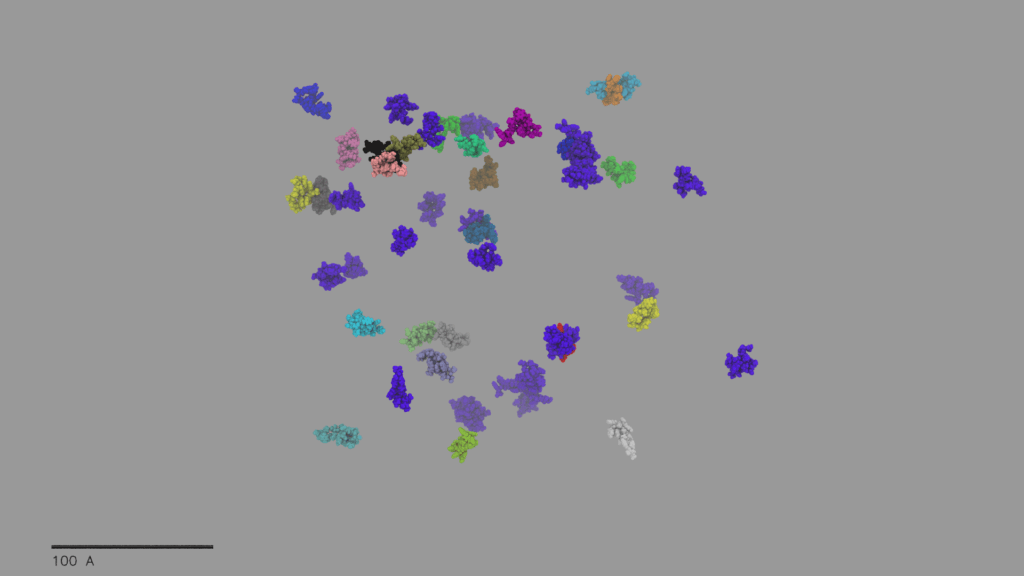How to design proteins easier and faster
Judith Hillen
Building success on failure: this is the idea of the British startup Peptone that applies AI methods to protein engineering. “By analyzing why and how millions of different mutants are going to fail, we can reciprocally identify what a successful protein should look like,” says Kamil Tamiola, Ph.D., co-founder and CEO of Peptone. The startup – awarded third place in this year’s startup bootcamp X-Linker – focuses on automated protein engineering born out of the research on intrinsically disordered proteins and the fundamentals of the protein folding process. “Intrinsically disordered proteins (IDPs) are a truly elusive family of molecules. Although IDPs have been implicated in many debilitating human disorders such as Alzheimer’s and Parkinson’s, their biological modality and molecular behavior remain poorly understood in comparison with folded proteins,” says Tamiola. In this interview with 5-HT, the CEO of Peptone explains how their platform can make the process of assessing the developability of a new protein in pharmaceutical companies faster and more convenient.
 Peptone Kamil Tamiola & Matt Heberling
Peptone Kamil Tamiola & Matt HeberlingWhat is the idea of Peptone?
At Peptone, we apply physics, statistical mathematics and machine learning to biological design questions. We have developed a proprietary system for physical reality simulations of proteins in disordered states, which accelerates the developability of peptide-based therapeutics. Making protein-based medicines is complex and expensive, especially because the synthesis of biologically active, yet soluble and non-toxic proteins is very complicated. In this process, failures occur very often – even the most successful protein engineering campaigns achieve a success rate of only 10 %. This is not because the pharma industry is incompetent. In fact, failure is an inherent part of the scientific discovery process. At Peptone, we follow a unique approach by focusing on failure instead of success: with machine learning methods that observe physical simulations we can evaluate millions of mutants of a specific protein and analyze why and how they are going to fail. Reciprocally, we can identify what to do in order to avoid these failures and to successfully design molecules with desired developability; e.g. solubility or self-aggregation propensity. With our platform, we want to contribute to making the production of pharmaceuticals faster, cheaper and scalable. In doing so, we shift the burden of high-throughput screening from the lab to the computer, so that our clients can refocus their pipelines on more important tasks, such as biological modality screening.
What kind of proteins are you focused on?
Our automated developability platform has delivered excellent results for multiple classes of high value therapeutics, including monoclonal antibodies (mAbs) and novel proteins that are intrinsically disordered (IDPs) or contain long intrinsically disordered regions (IDRs). For biologists, IDPs and IDRs are very difficult to study experimentally because they are predominantly poorly expressed in bacterial hosts, aggregate and display all sorts of aberrant behavior. Our calculations provide an experimentally testable insight into their manufacturing issues. Even though we cannot accurately determine what a protein will look like in its native state, we can identify which molecules are going to misfold or stay in an unfolded state, and connect this intel with their role in e.g. pathology.
What industrial applications do you see for your solution?
At an early, pre-clinical and discovery stage, we help pharmaceutical companies to assess the developability of high-value proteins. For millions of simulated mutants, we analyze how likely they are to aggregate, how soluble they will be, or how high the risk of off-site effects is – and which part of the proteins is responsible for the potential issue. We can connect these properties with experimental failures and help our clients to identify the most promising variants. Our technology not only addresses intrinsically disordered proteins, but also the design and optimization of monoclonal antibodies (mAbs). We give our clients indications on how to improve the solubility and aggregation properties of antibodies. Recently, we have also started to cooperate with clients who are trying to develop novel drugs against SARS-CoV-2. Based on the hypothesis that some parts of the new coronavirus have significant levels of intrinsically disordered regions, we want to provide intelligence to our clients by analyzing what types of proteins would bind to the virus or not.
What kind of AI methods do you apply?
We have developed our own molecular simulation engine which is highly scalable and specifically designed for the studies of proteins in unfolded states. This engine is connected to a machine learning framework which constantly learns from millions of simulations and compares their outcomes against failed experimental results. Furthermore, we have written a system to make sense of all this information, to visualize the key points and give our clients an idea of what to do.
 Peptone Aggregation Simulation
Peptone Aggregation SimulationHow do your clients benefit from using your platform?
First, using our platform can cut the period for assessing the developability of a protein from two years to two weeks. Our clients should spend their time answering scientifically relevant questions, not doing mundane tasks, such as testing the solubility of a protein – that is the workload we can take off their shoulders. Second, we provide access to the novel protein class of intrinsically disordered proteins that have an enormous pharmaceutical potential but are very difficult to work with under laboratory conditions.
Peptone does not only support protein engineers from pharma and biotech companies – you have also started your own research into novel proteins. What are you currently working at?
Together with our academic partners, we have discovered that some intrinsically disordered proteins can be used as a biomaterial. By repurposing and reengineering these proteins, we can let them aggregate in a specific way so that they form gel-like phases. This makes it possible to create biogels which have the potential to serve as medical applications e.g. in treating wounds. The research into novel molecules like this is something we are very excited about.
What is the story behind the foundation of Peptone?
Peptone was born out of many years of academic research. My co-founder Dr. Matt Heberling and I met during our Ph.D. times when we were working together in a protein engineering lab in the Netherlands. Our conversations were dominated by experimental failure. As a physicist, I wondered why our experiments failed all the time, and began to ask myself fundamental questions about toxicity, self-aggregation, or solubility. This was the starting point for our idea to build an autonomous and data-driven computer platform that would be able to simulate these aspects, combining available mathematical theory and easily obtainable experimental evidence. Three years ago, we started developing our technology. At the moment, we are scaling our platform, starting to service new clients, and also preparing for investment rounds.
What are your biggest challenges?
For us, the biggest challenge is to find our own voice in a market that is full of startups working with Artificial Intelligence and designing novel drugs. Our strategy is to focus on the high quality of our science, and to deliver a solution that actually brings value to scientists. The questions that we answer might not sound very exciting, but they are fundamentally important for science and make the development of drugs much more efficient and at the end of the day cost-effective.
You were part of this year’s startup bootcamp X-Linker – congratulations on the third place in our startup competition! How did you experience the program, and what were your most important learnings?
It was great to get to know German startups, corporates and investors, and to see how the German ecosystem works. We especially enjoyed the consultations with the lawyers in the mentoring sessions who were able to answer specific questions regarding a potential cooperation with German investors.
What is your vision for the future of Peptone?
We want to be the Amazon for proteins: a platform where you can design, optimize, and finally bring your proteins to the market as quickly as possible. We try to deliver convenience to the pharmaceutical industry and to answer as many fundamental questions as possible at the heart of protein design and production.
5-HT Chemistry & Health Newsletter
Want the latest tech and industry news, events, relevant info from the ecosystem and more?
Subscribe to 5-HT Newsletter now Subscribe to 5-HT Newsletter now
Become part of the 5-HT Chemistry & Health
Exchange ideas with innovative startups and future-oriented companies in our ecosystem. We look forward to meeting you!